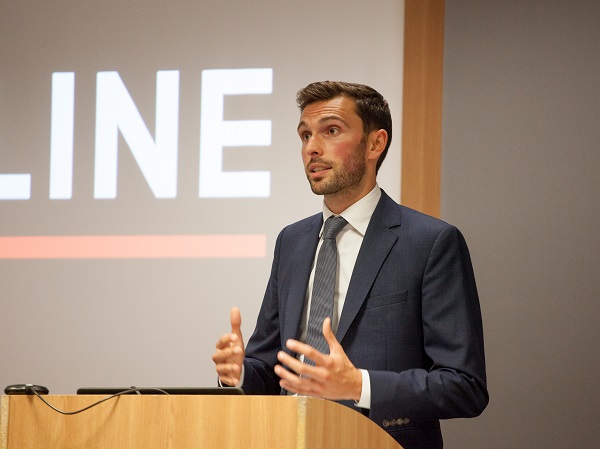
by Josh MacAlister
Since we set up the Frontline Academy (a collaboration between Frontline, the University of Bedfordshire, the Institute of Family Therapy and Kings College London) our focus has been to create a social work education programme that prepares people to be agents of change with a particular emphasis on assessed practice, the application of research and academic rigour.
Over the last three years we’ve been extremely fortunate to work with a talented range of academics, practitioners and thinkers and we’re proud of what we have created together; an innovative and rigorous master’s degree programme that qualifies people for social work.
The pilot phase has given us an opportunity to understand what makes the model work and where it can be improved. It’s in this context that we have made the decision to move to a model where Frontline will work with a university that accredits a programme devised and taught by a team who are based in-house.
Co-ordination difficult
We have found that coordinating between two organisations (Frontline and the University of Bedfordshire) and a number of other specialist organisations spread over multiple regions has been a challenge.
The different groups of staff have all brought value to the programme and the variety of backgrounds has been a strength. However, we received feedback that, at times, this approach led to confusion for participants, frustration for staff delivering the course and unnecessary complexity for our local authority partners.
This experience is not unique. Evaluations of Step Up to Social Work also reflect this coherence challenge. Having spoken with our partners, we believe that one team teaching the programme will not only improve the quality of the education provided in our current regions, but allow us to maintain and improve that quality as we expand into new regions.
Innovation
We are also keen to keep innovating. Those most closely involved in the programme – our participants and consultant social workers – tell us the key benefits of the programme are its focus on observed practice, the promotion of a systemic practice model and learning in a unit.
These innovations are now well established in the programme, but they were tough to implement. Bringing delivery in to Frontline will mean that we can continually focus on improving and experimenting with how people learn to become outstanding social workers.
Our university partners have been incredibly committed to the programme development and the team of tutors have helped prepare our cohorts to do great work with children and families. We want to work with many of them in the future and further participants will therefore benefit from their dedication, skill and expertise.
Working with universities
This announcement has caused some debate, among social work academics in particular, and it is important to clear up a few points about how Frontline wants to work with universities in the future:
- Frontline will continue to work with a university to accredit the programme and issue a master’s degree. The programme will always be focused on educating social workers with rigour to enable them to support those families who need them.
- In recognition of the importance of research, we will be sponsoring a number of our practice tutors to undertake a doctoral programme with a partner organisation so they can influence the future design of the Frontline model and add to a wider body of knowledge in social work with high quality research.
- We will set up an academic advisory group to guide the curriculum and we will be employing a large number of academics to work on the programme.
Widespread model
It is also important to note that the model of a university accrediting another organisation to deliver an academic programme is already used in social work and is widespread in other professions.
A cursory glance at the list of HCPC approved providers shows that some courses are already validated by a university which does not deliver the programme. Lots of post qualification training in social work is accredited by universities despite them not delivering the content.
In education there are a number of prestigious universities including Newcastle, Bristol, the Institute of Education and Goldsmiths who adopt an accreditation model where they award a degree for content delivered by other organisations.
Deeper debates
The reaction to our decision from social work academics has also prompted some deeper debates.
The false dichotomy between practice and theory is one such example. It has been suggested that with these changes our new model might exacerbate this division by isolating social work education and practice from academia.
I can understand this concern but I think it misses an essential point. You can and should be able to theorise about practice. We have always taken the view that learning how to do great practice is an intellectually demanding exercise that has academic underpinnings.
Practice and theory are not separate ‘buckets’ of work or fields of learning.
One is dependent on the other and therefore one team, whether at a university, a local authority or Frontline, should be able to bridge both. This is an implementation challenge for anyone educating social workers, so it’s about how to teach rather than who should teach.
Which leads to another question – where is practice wisdom created?
Earlier in the week a highly respected professor said the move “could be the beginning of a process that sees social work severed from the places where knowledge is created”. I simply don’t agree with this. Yes, many universities produce great research, but they aren’t the exclusive source of knowledge creation.
Exciting practice models
Local authorities are developing exciting practice models informed, refined and honed by the craft of excellent social workers – Essex, Leeds and the Tri-Borough to name just a few. Organisations like Dartington Social Research Unit and Research in Practice also produce excellent research. I want our programme to be both influenced by new ideas and research and also be able to contribute to the knowledge about what works.
There are many great social workers, well-regarded social work courses and brilliant social work students that have nothing to do with Frontline. In many cases, they existed long before Frontline was created. We want to play a part in bringing more great people into the profession and developing them to be the best social workers they can be for the children and families they serve.
Learning from our first three years has helped us improve our model. Changing how we work with universities in the future will allow us to bring greater coherence and innovation to our work. For the people that matter most – children and families who need great social workers – this should make a small but important difference.

 Step up to Social Work bursary to increase after decade-long freeze
Step up to Social Work bursary to increase after decade-long freeze 
 Facebook
Facebook X
X LinkedIn
LinkedIn Instagram
Instagram
You note:
“we have created … an innovative and rigorous master’s degree programme that qualifies people for social work”
Do you have any credible evidence re: this unsupported assertion?
Gary Holden
If the training of the professionals is not linked to the place where the cognitive base for the profession is developed, i.e. academic research, then it is not a profession, it is an occupation (see all the theory and research on the professions).
So to say that “many universities produce great research, but they aren’t the exclusive source of knowledge creation” is a misunderstanding of the point. Frontline may be involved in producing knowledge but they are not the knowledge producers – the Universities are. FL
is not a University and so this move degrades social work from a profession to an occupation.
This isn’t simply a debate about protecting Universities. It is a point about protecting the profession. The wider implications for this move seem to be lost on the FL team. The intentions may be honest but the consequence is potentially devastating for the profession. Perhaps they should read the history books of the probation service.
“to create a social work education programme that prepares people to be agents of change…”
really? more like agents of Conservative ideology with its approach that is clearly not focused on compassion or empathy and has no critical thinking about the way that the state also impacts to create inequality and social problems through its policies. This scheme is blatantly furthering the cause of neoliberalism and will cannibalise our profession, replacing management with “business minded” individuals and paving the way for further privatisation!
I had thought we had dispensed with the notion of certainty and the technical rational approach to social work as a result of the Munro review. The latest proposals for social work seem regressive and a bit naive about what day to day social work is like. The reason we need to embrace uncertainty is because the most of the difficult stuff in social work is not about knowing it is about feelings, ethics and our values.
By all means let’s improve skills and deepen our capacity for critical reflection. We should learn from what FL has done so far but surely it is far too early to know if it has been successful.Let’s also use the internationally available knowledge base surrounding this better. The work of Arnon Bentovim and colleagues barely gets a mention in this regrade but is more firmly embedded in the evidence than the approach put forward by FL.
I agree with James we need academic challenge and rigour both in universities and within the professor. I am afraid FL is carving out a rather narrow and limiting field of knowledge that will diminish the profession.
As an undergraduate social work student who has literally put sweat and tears into my practice, I was outraged to watch BBC news and find out graduates of all studies can decide to have a ‘career change’ and after a 6 week crash course be allowed to experiment with service users’ lives for a year, then be recognised as qualified social workers.
I am disappointed at the apparent business like attitude towards social work, Frontline has portrayed this scheme as a fast track to career success, with the ambition of attracting a ‘higher calibre of graduates’. Social work is not a job for those wanting recognised financial success, people should first have a drive for empowering individuals and I am disgusted that anyone can suddenly be responsible for lives of vulnerable children and families.
I understand the need for better frontline child protection training however, surely social work is about more than the media’s perception of social work failings with children. Mental health, domestic violence, elderly and substance misuse are just a few features of social work that go beyond the simplistic view of what social work is to novelists. I fear grater poorly handled child protection cases due to these new ‘social workers’ who may have underestimated the skills and drive needed.
All professionals and students that I know in practice, placement and university are extremely worried about a programme which lacks the core principles of why people go into social work, which is not for glamour or a challenge.
I have learnt a great deal during my time as an undergraduate, particularly concerning values, beliefs and rapport building. I whole hearted disagree with this new programme.
Hello:
Is Frontline still operating? I have not heard an answer to my question posted 2/20.
—
“You note: “we have created … an innovative and rigorous master’s degree programme that qualifies people for social work”
Do you have any credible evidence re: this unsupported assertion?”
—
I know it takes time to gather evidence, but from my limited observation, it seems that the current UK party in power is shoveling piles of money into Frontline. If that is true, I am simply trying to understand the logic of that behavior.
Looking forward to hearing from someone.
Regards, gary